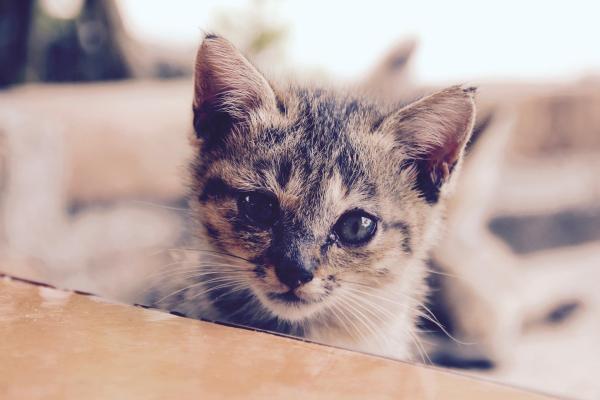How to Socialize a Kitten With Other Cats



See files for Cats
When a kitten arrives in our home, we hope to give them the best start in life. We want to do what we can to ensure their health and happiness, something for which proper socialization is essential. However, not all cats come from ideal situations. Adopting a cat from a shelter or even bringing a feral kitten in off the streets can provide challenges, but every cat will need to be socialized regardless of circumstance. If they are to coexist in a home with other cats, animals and humans, they will need to know the correct boundaries and behaviors.
At AnimalWised, we explain how to socialize a cat with other cats and humans. We will explain what is the ideal situation for cat socialization, as well as how to make up for it when the situation is less than ideal.
What is socialization in kittens?
As cat guardians, it is easy to only see socialization as a process by which felines can learn to interact with humans. It is true that cats need to adapt to human environments. In the wild, a cat will need to be fearful of those around them and see which behaviors are conducive to survival. In the domestic environment, their basic needs are covered, so they are better able to develop relationships of trust with others.
However, socialization is a process which helps them to feel secure in all environments. This means it is important if you have other cats in the home, pets of another species or even human guests coming to visit. Socialization helps them to know their boundaries so they do not cause disruptions to the home or harm to themselves.
Socialization can happen at any time of life, but the most important period for socialization is when they are a kitten. Kitten socialization can be divided into two main periods:
- Primary socialization (2-7 weeks): once the kitten has opened their eyes and starts to be aware of their surroundings, the first socialization period begins. During this time, the kittens will learn to interact with their siblings and mother, learning some of the most fundamental aspects of kitten behavior. This will include developing their basic functions, motor skills and understanding communication.
- Secondary socialization (9-16 weeks): now the kitten has developed their basic skills, they can start to hone their feline instincts. This includes cat hunting behavior, something which will remain even in the domestic environment. They will start to engage in object play more than only interacting with their siblings. Since the weaning period in kittens will end around this time, the young cat will become more independent.
Since much of their early socialization occurs with their mother and siblings, it is very important they remain with their mother for at least 8 weeks of life. Since the mother will start to reject them of her own accord around by 12 weeks of life, it is ideal if we can let the kitten stay with her until this happens. However, it is important for humans to interact with them to some degree from the primary socialization period onward.

Why is kitten socialization necessary?
It is possible to socialize an adult cat, but it is much more difficult than with a kitten. Just as a good socialization period for a kitten will help establish positive relationships and set important boundaries, poor socialization has the opposite effect. Cats poorly socialized as kittens will likely develop behavioral problems and not know how to interact positively with others.
Part of the reason is that all cats will start to become fearful of the unknown and are likely to be wary of new individuals after around 12 weeks of age. This is why it is important they interact with humans before this time.
When a kitten is removed from their mother and siblings too early, we can take over their basic needs. Importantly, this will mean feeding them, weaning them and helping them to carry out basic feline behaviors. However, we are not feline and our ability to communicate with the kitten will be limited. While we can do our best to understand feline body language, other cats know this innately and comprehensively.
Poor socialization as kittens will make it more difficult for cats to understand our ways. This will lead to insecurity. Often, this can result in the cat being very nervous around others and may even become aggressive. Some cats might still become affection with humans, but they may not respect their boundaries well.
Feral cats are domestic cats which have been brought up without a human family. These cats will have to fend for themselves and may experience trauma. For this reason, it can be very difficult to socialize feral adult cats, although feral kittens should have a better chance.
Socializing kittens with other cats
Removing a kitten from their mother too early can be detrimental to their socialization. For this reason, it is best we adopt a kitten between 8-12 weeks of life. There are many instances when kittens have been adopted before this time and gone on to live happy lives, but they did so in spite of being adopted early and it is not ideal.
There are instances when the kitten may have no choice but to leave their mother and siblings too early. This occurs if the mother is sick, has died or has rejected the kitten from her nest. Sometimes this happens because the kitten is ill, so it is important the first thing we do when we find abandoned kittens is take them to a veterinarian.
Before we can introduce a kitten to anyone else, we need to ensure they have their basic needs. Buy them a bed with a comfortable blanket, provide a litter box (even if they are not yet trained to use it), ensure they have their food and anything else they may need. The area they are kept must be warm, comfortable and free from stressful noises.
If we bring a kitten into the home, it is best if we can introduce them to other cats. This is not something we should do hastily. To introduce a kitten into the home, we need to keep them separated for the first few days. Then we can slowly open up the spaces between them and see how they interact together. See our guide on how to introduce a new cat to another cat in the video below.

Socializing kittens with humans
The kitten you adopt into your home may have had experience with other humans. This is the case if you adopt them from a breeder, a friend or a shelter. However, you may be the first human a feral kitten has encountered. In the latter cases, it will be a case of starting from scratch. This can be more difficult, but it is preferable than if the kitten has experienced trauma or stress when interacting with other people.
As with any type of socialization, we will need to ensure the kitten has everything they need. This includes their area being kept calm and safe.
For kittens, getting used to humans means more than socializing with their family. It is good to have friends and family come around so they can get used to strangers as well. Do not force contact, but allow them to approach and be gentle. Do not pick them up, at least during the early stages. Forcing interaction at these early stages will be counterproductive to proper kitten socialization.
It is very helpful to have toys and treats available. These will not only provide positive associations, but they are practical assistance to develop their feline abilities.
Tips to socializing kittens
Fundamentally, socializing kittens with other cats and humans will involve the animal interacting with others. How this goes will depend on the individual, but it is rare that a kitten will not be able to adapt to some degree. However, there are important considerations we need to make as their guardian to best ensure proper socialization. They include:
- Positive reinforcement: the best way for a cat to learn is to associate experiences, other cats and people positively. This means we need to reward good behavior with treats, affection and encouragement.
- Never scold: just as positive reinforcement in cats is beneficial, negative reinforcement is counterproductive. Scolding a cat when they do something wrong can cause trauma and provide stressful situations. Also, if you scold a cat for doing something after the fact, they won't be able to associate the reprimand with the action. This will cause them to be confused and associate otherwise positive actions negatively.
- Environmental enrichment: for them to associate their environment with positive experiences, we need need to enrich a kitten's environment. Provide toys and accessories which will let them express their natural instincts and provide both cognitive and physical stimulation. Ensure their environment has minimal stress and always provide spaces for them to hide comfortably when they need to.
- Speak calmly: ensure your own demeanor is suitable for the kitten. Although you may be excited to have them in your life, a young kitten can easily interpret your exuberance as something threatening. Speak reassuringly and encouragingly. Part of their socialization will involve getting used to your mannerisms and speech, so start gently.
- Be patient: do not force your cat to interact with you. Let them come to you and let them lead in terms of interaction. If you pose no threat, the cat will eventually want to spend time with you. Especially with cats which have experienced trauma, you may not have the kind of relationship you hoped for. Some cats may be standoffish or show their affection in less demonstrative ways. This doesn't mean they don't love being at home with you.

Can you socialize a feral kitten?
As we have said above, it is possible to socialize a feral kitten, but it is usually more difficult. They should have learned much of their basic behaviors and communication once they reach a certain age, but they can still learn to adapt.
However, once a feral kitten reaches four months of age, it is very difficult to socialize them properly. With feral cat they will usually be adapted to living outdoors and bringing them into a home will usually be seen as restricting their freedom.
There are exceptions, but usually the feral will cat will have to come to our home. If we were to trap one and bring them inside, it is not likely they will ever feel secure. If you leave food for a feral cat and allow them to come inside at their own pace, it may be more likely. Often these cats are those which were once living with a family, but have since escaped or been abandoned. This means they are already part-socialized.
If you want to read similar articles to How to Socialize a Kitten With Other Cats, we recommend you visit our Basic education category.







